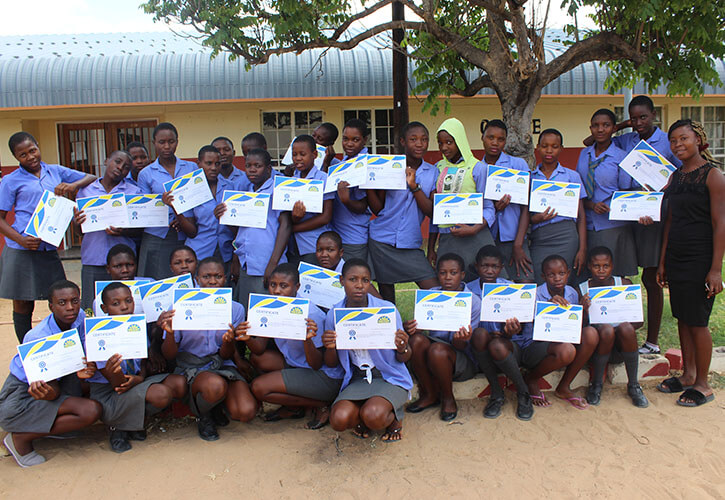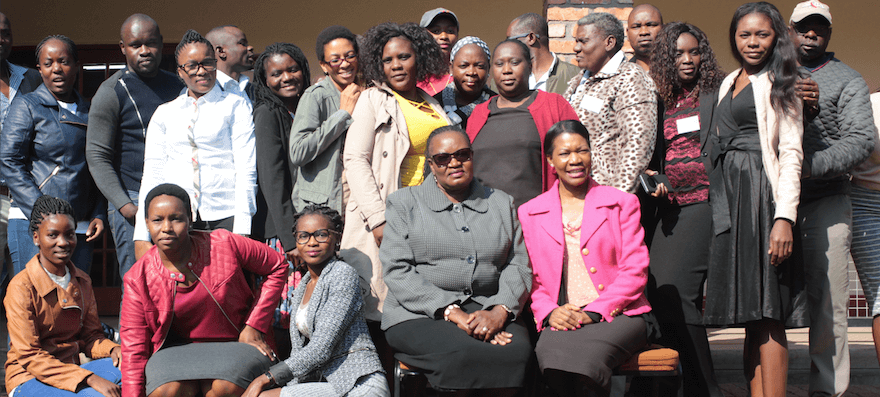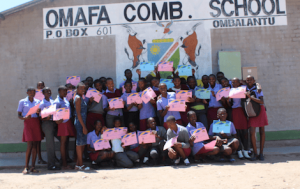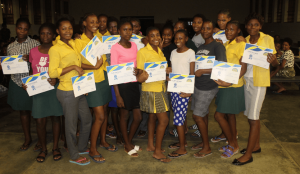
Adolescent girls and Young Women Programme (AGYW)
The Society for Family Health (SFH) is among the implementing agencies for the Adolescent Girls and Young Women (AGYW) initiative with funding from Global Fund. This initiative started in the last quarter of 2016 and is being implemented in selected schools and health facilities in Kunene, Omaheke, Zambezi, Omusati, Kavango East and Kavango West.
The Namibia Population and Housing Census of 2011 indicate that the country has a relatively young population, where 66% of the population is below the age of 30 years. Young people below the age of 25 makes up 58% and adolescents (10-24 years) constitute 33 percent of the total population. The vulnerability of the young people is a concern in the context of Namibia with 43 percent of new infections occurring among 15-29 of age. As women age, HIV prevalence increases with the highest prevalence observed in 20-24-year-old at 9.3 percent. Women and girls, and poor women specifically are particularly vulnerable to HIV infection due to gender inequality and gender based violence. Women’s economic marginalization forces them to depend on men, increasing the likelihood of involvement in “transactional and inter-generational sex, both key drivers of the epidemic”.
Overall aim of this initiative is to reduce vulnerability of adolescent girls and young women to HIV infection, unintended pregnancies and related social determinants. Therefore interventions are designed with the objectives of:
- Ensuring that adolescents complete schooling, avoid pregnancies and HIV infection
- For adolescent and young women already living with HIV, supporting them with life skills education and related services for positive living
- Ensuring greater access to comprehensive adolescent-friendly and adolescent-centered sexual and reproductive health services It is clearly known that traditional biomedical interventions serve only as one piece of the solutions to HIV infection in adolescent girls and young women.
Other structural drivers of risk for HIV infections be it from legal, economic and social factors fall outside the health and education sectors. These factors are not included in this initiative and should be highly considered as the program expands.
The current AGYW program is designed around the following interventions:
- Promoting adolescent-friendly sexual and reproductive health services that address the barriers to care faced by women and girls;
- Educating and mobilizing young boys and men for HIV testing services and linkage to voluntary medical male circumcision;
- The fact that the same girls and young women who are at risk of HIV are also at risk of unintended pregnancy, the program highlights the use of dual protection methods for the prevention of unintended pregnancy and HIV infection;
- Training providers in the provision of care that is adolescent-friendly across a spectrum of services, from HIV testing to violence screening and contraceptive counseling, and the possibility for PrEP provision to young women at substantial risk for acquiring HIV infection.
Challenges addressed:
- Staff demonstrated that it is possible (and indeed necessary) to genuinely involve and vest leadership in young people in all aspects of project planning and implementation to ensure project success.
- Young people who were not in school often wanted a compelling reason for participating in the SRH sessions. Adjustments during the latter phase addressed many of these challenges; consistently holding sessions at a specific time and location, simplifying messages and ensuring that they spoke to the realities of this population’s lives, and in some cases offering small refreshment to encourage participation and retention.
- Multidisciplinary and multifaceted approaches play an integral role in ensuring that those adolescents that are not performing well on ART, root causes are addressed through various actors including parents/guardians, social workers; but most importantly, peer leadership psychosocial activities should be ongoing Club activities.
Highlight of Achievements
- Approval was granted by the Ministry of Education, Arts and Cultures through the office of the Permanent Secretary to establish clubs and conduct outreach sessions on SRH in 60 schools in the 6 priority regions namely Kunene, Omusati, Omaheke, Kavango East, Kavango West, and Zambezi. Similarly, MoHSS granted permission to SFH to revive/establish Teen Clubs for adolescents living with HIV at the health facilities in the 6 regions.
- 26 Health Care workers were trained on positive parenting
- 434 AGYW were tested for HIV and received their results; out of which 22 tested positive and have been successfully linked to care and treatment
- 67 AGYW received SRH services including contraceptive
- 60 Teen clubs with a total of 1800 Adolescent Girls were established in schools
- 60 community facilitators were trained as Training of Trainers in SRH and HIV prevention.
- 16 ALHIV clubs have been established in the following regions: Zambezi, Kavango East, Omaheke, Omusati, Kunene region
- 6258 out of school girls were reached with SRH sessions
- 447 young women from tertiary education were reached with SRH sessions
Positive Parenting workshop

26 Participants at this training include Program Officers from the Society for Family Health, Community Health Facilitators, and health providers from the Ministry of Health and Social Services from Omaheke, Zambezi, Kavango East & West, Omusati and Kunene region.
The overall objective of the training was to equip participants with skills on how to build positive relationships with children and adolescents using various communication skills; and to enable them to provide a supportive and user-friendly, client oriented service which respects the privacy of parents and their children including adolescents living with HIV.
Lessons learnt:
- It is clear that government does not tolerate child exploitation and violation, in this case child marriage. This leadership is critical in sending a signal of the importance of addressing child marriage and other violence against children.
- Strong collaboration and coordination, and open communication, can help to build alignment across sectors and stakeholders to prevent child marriage.
- There are multiple factors impacting on ALHIV poor school attendance and school dropouts. Among these include limited information to and access to sexual and reproductive health services; poverty-fuelled condition.
- The youth facilitators and participants were the key to this project’s success. Their enthusiasm, strength, wisdom, and commitment to the project allowed it to flourish and continued in communities.
- Well-trained and supported youth are often the best educators of their peers about reproductive and sexual health issues. Providing them with ongoing support and supervision will ensure that they remain inspired, effective, and not overwhelmed with their responsibility, thus preventing high burnout and turnover rates.
- The monthly assessments of efforts to reach out-of-school youth represented a turning point for the project. It revealed weak points in project implementation especially when disbursement of funding for the project was delayed, and provided an opportunity for the project to modify the strategy for reaching the target population.
Teen Clubs for adolescents living with HIV
For many young boys and girls who are living with HIV and on ART often lack strong social networks, the personal relationships they forge at Teen Club are the most invaluable part of initiative. Discussions on reproductive and sexual health, stigma and discrimination, living positively, building healthy relationships, and disclosure of status (among many others) have empower these young boys and girls to engage openly in addressing their concerns as they relate to their status.


Why Teen Clubs for adolescents living with HIV?
- To support adolescents living with HIV (ALHIV) in coping with stressors and to encourage adolescents to develop into healthy, positive adults.
- Provides life skills and positive living education, self-esteem building exercises,
- Support to cope with stigma and misinformation, and a peer support network to assist with some of the mental health and wellness issues that come with adolescence and HIV.
- Provides a social support system of adult volunteers and peer role models that are dedicated to the teens’ quality health care and well-being.
- Provides a friendly and open environment wherein its members can momentarily escape the challenges of living in poverty and with HIV infection.
- Enables teens to seek out additional and new information on what it means to live with HIV/AIDS.
wordpress theme by initheme.com


1 comment. Leave new
Like!! I blog frequently and I really thank you for your content. The article has truly peaked my interest.